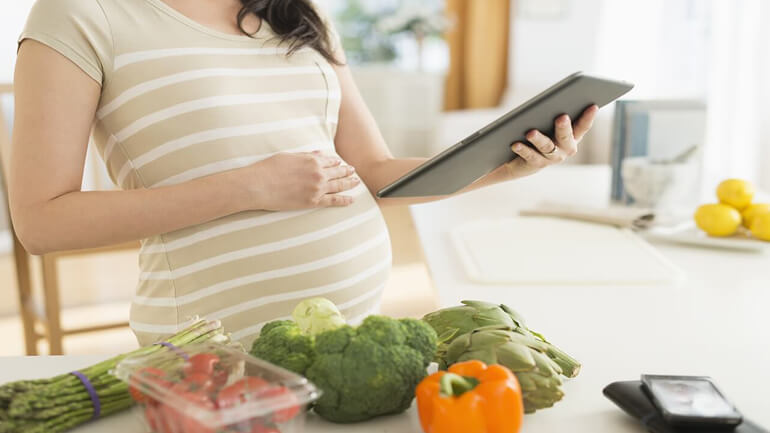Is vegan pregnancy safe

As long as you eat a wide range of healthy plant foods and include key nutrients in your diet, you can get all the nutrients you and your baby need without eating animal products. Also, if you are a vegan who does not eat any animal products including meat, fish, poultry, eggs, dairy and honey, your pregnancy must be under the supervision of a nutritionist. In some cases, it is also necessary to use fortified foods or vitamins and supplements to ensure that you are getting enough of the nutrients you need. In the pre-pregnancy examinations, inform your doctor about your vegetarianism.
Protein
Eat several servings of protein-rich foods every day. Good sources of plant protein include legumes, soy products, nuts, seeds, and nut butters.
iron
You will have a blood test early in your pregnancy to check your iron levels. If iron levels are low, your doctor may also recommend taking an iron supplement.
A pregnancy supplement may provide some iron. But you also need to eat several servings of iron-rich foods every day. Good sources of iron include fortified breakfast cereals, whole-grain or fortified bread, fortified pasta, legumes, tofu and other soy products, and leafy greens such as spinach and beets.
Avoid drinking tea or coffee with your meals because these beverages contain tannins and polyphenols that make it harder for the body to absorb iron from plant foods. Instead, eat something rich in vitamin C, such as homemade orange juice, homemade ketchup, or a homemade broccoli rabe, as vitamin C helps your body absorb iron.
zinc or zinc
Try to eat several servings of zinc-rich foods every day. Many iron-rich foods, such as beans, soy products, fortified breakfast cereal, and whole grains contain zinc. Other good sources of zinc for vegetarians include nuts and seeds.
Calcium
Eat several servings of calcium-rich foods every day. Good sources of calcium include:
Almonds or sesame seeds that must be in your diet.
Almond milk or soy milk, fruit juice, and breakfast cereals or cornflakes that are fortified with calcium. If you are only a vegetarian and not a vegan, calcium-enriched milk, cheese, and yogurts can be a good choice for your daily calcium supply.
White beans, sugar cane molasses, chickpeas, calcium coagulated tofu. To know if tofu is coagulated with calcium, look for a calcium salt such as calcium chloride or calcium sulfate in the tofu ingredients.
Some green leafy vegetables include kale, turnip greens, Chinese cabbage, broccoli, and bok choy. Other sources such as spinach, beetroot and beetroot also contain calcium, but the body does not absorb calcium from these foods as well as the previous ones.
Vitamin D
This vitamin helps the body absorb calcium. Some types of vegetable milks, orange juice and cerlac are enriched with vitamin D. Many pregnancy supplements also contain vitamin D. If your supplement does not contain it, it is better to take a vitamin D supplement.
Vitamin B12
Vitamin B12 plays an important role in fetal brain development and is mainly found in animal products. Therefore, vegetarians need a reliable alternative source for their daily intake of vitamin B12. Plant-based sources of this vitamin include supplements, fortified foods and drinks such as soy milk and other plant-based milks, breakfast cereal, and edible yeast. If you do not eat foods containing vitamin B12 every day and your pregnancy supplement does not contain it, you may need to take a separate supplement to get this vitamin with the approval of your doctor.
Iodine
Iodine is also important for fetal brain development. Iodized salt and dried seaweed are good plant sources of iodine. If you don't eat a lot of these substances, check your pregnancy supplement to make sure it contains iodine.
DHA
DHA is an omega-3 fatty acid that promotes brain and eye development in the fetus. This substance is found in fish, fish oil and seaweed. Since it can be difficult to get DHA from sources other than fish, it's best to take an omega-3 supplement derived from seaweed and suitable for vegetarians.
Remember to always talk to your doctor, midwife or nutritionist before taking any supplements during pregnancy. In addition to eating a variety of fresh, frozen or canned fruits and vegetables or whole grain products, make sure you eat foods or supplements that provide the above nutrients that are important for a healthy pregnancy.
برای نمایش آواتار خود در این وبلاگ در سایت Gravatar.com ثبت نام کنید. (راهنما)






















































ایمیل شما بعد از ثبت نمایش داده نخواهد شد